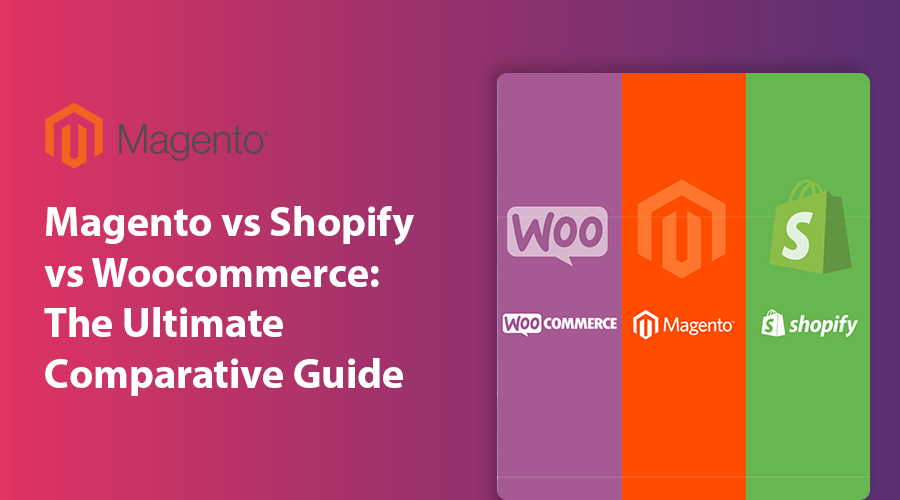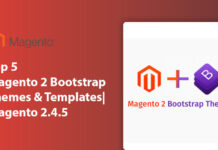
Which eCommerce platform should I choose? I am sure this question has stumped every eCommerce entrepreneur at least once.
The eCommerce landscape has changed dramatically over the last decade. From Amazon to Alibaba, retailers are now competing on multiple fronts. They need to invest heavily in their websites to stay competitive. It means choosing the right eCommerce solution becomes even more critical.
Picking the right eCommerce platform is crucial for success. There are hundreds of options out there, each with its pros and cons. This article compares three leading solutions: Magento, Shopify, and WooCommerce. Each offers unique features and benefits but also comes with its drawbacks.
Magento vs Shopify vs Woocommerce – Now the question is, which is the best platform FOR YOUR eCommerce website?
So let’s dive straight in!
Table of Contents
I. What is Magento?
Magento is one of the world’s leading enterprise-level open-source PHP-based eCommerce platforms. Magento, developed by Magento Inc. in 2008, is currently owned by Adobe since 2018.
Magento has a market share of 0.8% of all known websites, placing it as the 9th best platform globally. It has advanced capabilities that provide everything you need to run an online store, including inventory management, product catalogs, customer relationship management, order processing, shipping and fulfillment, reporting, analytics, and more.

Pros:
- Supports both B2C and B2B (omnichannel) commerce
- Scalability
- Security
- Customization Abilities
- Built-in Features
- Advanced SEO
Cons:
- Complex Architecture
- Hosting and Maintenance Costs
- Needs Plugins
- Requires Magento Development Services
- Technical Knowledge for Customization
II. What is Shopify?
Shopify is a web-based eCommerce solution built specifically for small businesses and allows merchants to sell their products directly from their websites or apps. Shopify was founded in Canada in 2006 and owns approximately 2.1% of the world’s market share. Shopify is similar to Magento, but it focuses solely on selling physical goods.
It supports B2B eCommerce and is known for being user-friendly. However, it allows you to set up an online store quickly and easily. Shopify is an excellent choice for those looking to launch their online stores.

Pros:
- Less additional costs
- Centralized Support System
- Easy User Interface
- Built-in Tools
- Extensive Marketplace
- Customizations and Custom Templates
- Third-Party Integrations
Cons:
- Manual App Integrations
- Tedious Development Process
III. What is WooCommerce?
Woocommerce has become the de facto standard for eCommerce platforms. WooCommerce is the most popular and efficient free open-source eCommerce plugin for WordPress. It holds the highest market share in the business at 35.8% and is said to power over 40% of the websites on the entire internet. WooCommerce is compatible with almost every CMS out there. It is very flexible and can be customized to suit your needs.
WooCommerce lets you build an online store within WordPress itself. It is very popular among bloggers and content creators. It allows you to sell anything from clothing to electronics to books. In addition, it comes with built-in features such as inventory management, shipping options, customer support, and much more.

Pros:
- Flexibility
- Limitless Customization and Designs
- Customer and store administrator accounts
- Advanced Security
- Interactive Community
- WordPress Support
Cons:
- Lack of Central Support
- Need Advanced WooCommerce Development Services
- Painful Set-Up Process
- Additional Costs
IV. Overview of features: Magento vs Shopify vs WooCommerce
| Features | WooCommerce | Shopify | Magento |
|---|---|---|---|
| Launch Year | 2011 | 2006 | 2008 |
| Salient Features | Open-source WordPress-based | All-in-one PlatformSingle Dashboard | Open-source PHP-based |
| Websites Powered | 3,876,748 | 3,740,000 | 734,990 |
| SEO | Supported | Supported | Supported |
| Scalability | Coding KnowledgeDeveloper AssistanceAdvanced Hosting | Only Shopify Plus | Highly Scalable |
| Ease of Use | Easy | Easy | Difficult |
| Security | High | High | High |
| Customer Service | WordPress Support Forum | 24/7 Central Support | Only with Enterprise Edition |
| Pricing | Pricey | Free | Free or Premium |
| Renowned Clients | · Porter and York · Barefoot Buttons · Underwear Expert · The Good Batch · Untold Wish · Root Science · Marché du Pre · Bluestar Coffee Roasters | · KKW Beauty · Kylie Cosmetics · Gymshark · Fitbit · Penguin Books · Hyatt Hotels Corp · Red Bull GmbH · Whole Foods Market | · Helly Hansen · Sigma Beauty · Ford · Monin · Liverpool · Vizio · Landrover · Nestle Nespresso |
| Virtina’s Take | Fit for small to medium-scale businesses | Suitable for a small enterprise looking for future scalability | Best for enterprise-level outfits needing feature-rich websites |
V. Main factors for a deep comparison
- Hosting
Shopify is not a hosted platform, so you have to host it yourself, whereas Magento and Woocommerce are hosted platforms.
- Ease of Use
Shopify is the easiest to use and does not require any prior coding experience. Woocommerce is the most flexible and customizable but will need expertise when it comes to customizations and integrations. Magento is the least user-friendly of the lot, requiring programmer-level expertise or hiring Magento developers. On the other hand, WooCommerce also supports plugins like the WooCommerce Measurement Price Calculator, allowing store owners to sell products based on custom measurements ideal for fabric, flooring, or liquids
- Pricing
Shopify is the most expensive of the three with three plans – Basic Shopify at $29/month, Standard Shopify at $79/month, and Advanced Shopify at $299/month. Magento falls in the middle with the community (free) and enterprise (paid) editions. Woocommerce ends up being the cheapest of the lot because it is free. But you will have to pay $15 for the domain name, $65/year for an SSL certificate, and $120 /year for website hosting to operate your WooCommerce store.
- Site Speed and Performance
Shopify has the best website speed and performance. Magento comes a close second with high-feature performance. WooCommerce lacks the punch in speed and performance in comparison.

- Scalability
Magento is known for scalability and is hence favored by big companies. Shopify falls short in scalability, and you will have to depend on the pricey version Shopify Plus if you are looking to grow your enterprise. WooCommerce is scalable but needs coding knowledge and WooCommerce Development Services to create a good website.
- Ease of customization
Shopify is the easiest to customize, and Magento is the hardest to customize. WooCommerce stays in the middle. Nevertheless, Magento and Woocommerce are more flexible than Shopify.
- Security
Magento is more secure than Shopify, but Shopify is more secure than Woocommerce. But all three platforms are more secure than most others in the market.
- Community
Magento and Shopify have a large community of developers and more resources to help you fix problems. But WooCommerce wins with the best support from the WordPress community.
- Tech Support
Shopify has 24/7 centralized support through calls, emails, chats, or social media. Magento offers support but, in most cases, feels lacking. But you get exceptional services in the premium business extension. Since WooCommerce is free, its customer support is often inadequate.
- SEO
All three platforms offer excellent SEO support. Shopify has built-in auto-generated canonical tags for SEO services. Magento store owners acquire more control over their website’s SEO elements, such as the robots. txt, sitemap. XML, redirects, and metadata. But WooCommerce is a clear winner if you want to exploit the edges of SEO services since, as a WordPress Plugin, it comes built with SEO-specific options.
VI. Summing up the salient features

- Shopify is a hosted platform; Magento and Woocommerce are not.
- Shopify is the easiest platform to set up your eCommerce store on, but it’s also the least flexible.
- Magento and WooCommerce are more complex to set up and maintain but are more flexible.
- Shopify is great for smaller businesses, WooCommerce for small and mid-market outfits, and Magento for enterprise-level retailers.
Final notes
All three platforms are the titans of the eCommerce industry and are armed with specific powers. It all boils down to how you want to portray your website and conduct your business. The selection process depends on your business type, enterprise size, budget, your technical know-how, required functionality, etc., among others.
We have listed the comparative study of all the three leading platforms. Now it is up to you to decide which one you want to power your website. If you want assistance setting up any of these platforms, please feel free to contact us.












![[SALE OFF] Discount 30% All Premium Extensions On Christmas And New Year 2025 christmas-and-new-year-2025](https://landofcoder.b-cdn.net/wp-content/uploads/2024/12/christmas-and-new-year-2025-1-218x150.png)






